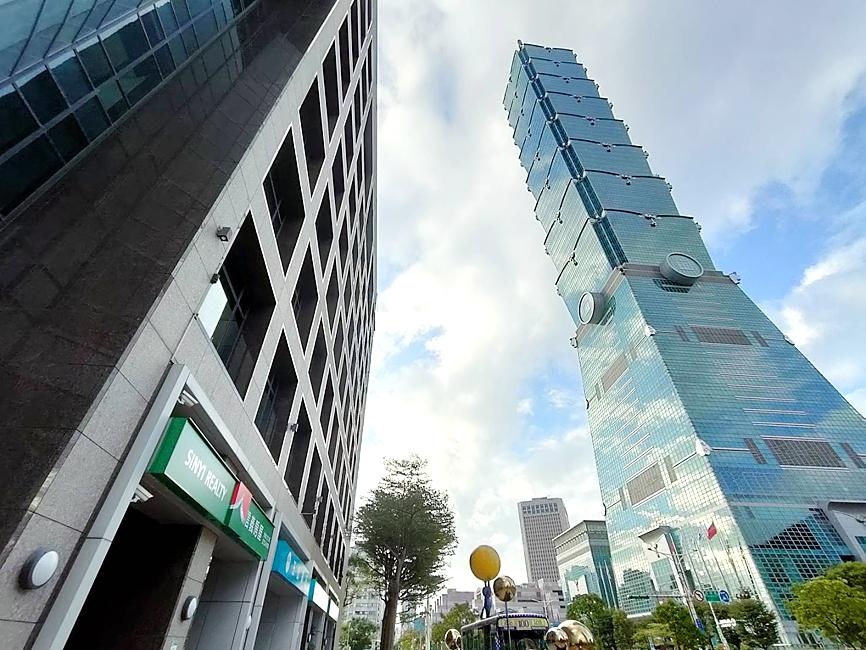The Taipei 101 skyscraper in the capital’s Xinyi District (信義) held on its title as the “King of the Land” nationwide for the ninth consecutive year, with the property valued at NT$6.3 million (US$226,782) per square meter, while buildings in other locations lost value due to the COVID-19 pandemic, the Taipei City Government said.
The changes in ranking and value came after the Taipei City Government adjusted assessed land value for taxation purposes next year. Homeowners have to pay land taxes annually and land value increment taxes upon selling their houses.
The Shin Kong Tower (新光摩天大樓) across the Taipei Railway Station in Zhongheng District (中正) ranked second at NT$6.08 million per square meter, but risks being overtaken by Bellavita Mall, Breeze Xinyi Mall (微風信義) and Cathay Landmark (國泰置地廣場) near Taipei 101 at NT$6.04 million per square meter, it said.

Photo: Hsu Yi-ping, Taipei Times
Land values in Taipei rose by an average of 3.41 percent, led by Nangang District (南港) with a 4.22 percent gain, attributable mainly to improving infrastructure, city officials said.
Neihu District (內湖) also fared strongly, with a 4.1 percent increase, thanks to the presence of major technology firms.
The city government said it would not extend reliefs on land taxes next year as businesses have largely resumed normal operations.
Shihlin District (士林) saw its land value rise 2.26 percent, as it remains affected by a lack of domestic and international tourists, officials said.
For similar reasons, major hotels in Taipei saw their land value decline. The value of Mandarin Oriental Taipei (文華東方酒店) dropped 5.94 percent, while Grand Hotel (圓山飯店) and the Regent Hotel Taipei lost 4.84 percent and 3.89 percent respectively, officials said.
Furthermore, land value in the Shihlin business district weakened 6 percent, while the Wanhua-Ximen (萬華西門) area and Daan District (大安) both slid 2 percent.
As for residential complexes, The Palace (帝寶) remained the most expensive for an 11th straight year at NT$4.65 million per ping (3.3m2), followed by a building in Xinyi District at NT$4.24 million, the city said.
Taipei homeowners will have to pay an extra NT$378 in land taxes next year based on the land value adjustments, officials said.
Property transfers in the city rose 12.36 percent to 30,799 this year, while prices climbed 2.92 percent from a year earlier, suggesting a stable improvement, officials said.

MULTIFACETED: A task force has analyzed possible scenarios and created responses to assist domestic industries in dealing with US tariffs, the economics minister said The Executive Yuan is tomorrow to announce countermeasures to US President Donald Trump’s planned reciprocal tariffs, although the details of the plan would not be made public until Monday next week, Minister of Economic Affairs J.W. Kuo (郭智輝) said yesterday. The Cabinet established an economic and trade task force in November last year to deal with US trade and tariff related issues, Kuo told reporters outside the legislature in Taipei. The task force has been analyzing and evaluating all kinds of scenarios to identify suitable responses and determine how best to assist domestic industries in managing the effects of Trump’s tariffs, he

TIGHT-LIPPED: UMC said it had no merger plans at the moment, after Nikkei Asia reported that the firm and GlobalFoundries were considering restarting merger talks United Microelectronics Corp (UMC, 聯電), the world’s No. 4 contract chipmaker, yesterday launched a new US$5 billion 12-inch chip factory in Singapore as part of its latest effort to diversify its manufacturing footprint amid growing geopolitical risks. The new factory, adjacent to UMC’s existing Singapore fab in the Pasir Res Wafer Fab Park, is scheduled to enter volume production next year, utilizing mature 22-nanometer and 28-nanometer process technologies, UMC said in a statement. The company plans to invest US$5 billion during the first phase of the new fab, which would have an installed capacity of 30,000 12-inch wafers per month, it said. The

Taiwan’s official purchasing managers’ index (PMI) last month rose 0.2 percentage points to 54.2, in a second consecutive month of expansion, thanks to front-loading demand intended to avoid potential US tariff hikes, the Chung-Hua Institution for Economic Research (CIER, 中華經濟研究院) said yesterday. While short-term demand appeared robust, uncertainties rose due to US President Donald Trump’s unpredictable trade policy, CIER president Lien Hsien-ming (連賢明) told a news conference in Taipei. Taiwan’s economy this year would be characterized by high-level fluctuations and the volatility would be wilder than most expect, Lien said Demand for electronics, particularly semiconductors, continues to benefit from US technology giants’ effort

‘SWASTICAR’: Tesla CEO Elon Musk’s close association with Donald Trump has prompted opponents to brand him a ‘Nazi’ and resulted in a dramatic drop in sales Demonstrators descended on Tesla Inc dealerships across the US, and in Europe and Canada on Saturday to protest company chief Elon Musk, who has amassed extraordinary power as a top adviser to US President Donald Trump. Waving signs with messages such as “Musk is stealing our money” and “Reclaim our country,” the protests largely took place peacefully following fiery episodes of vandalism on Tesla vehicles, dealerships and other facilities in recent weeks that US officials have denounced as terrorism. Hundreds rallied on Saturday outside the Tesla dealership in Manhattan. Some blasted Musk, the world’s richest man, while others demanded the shuttering of his